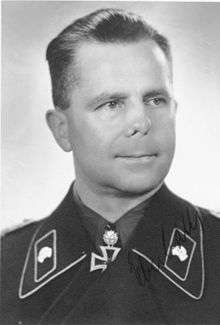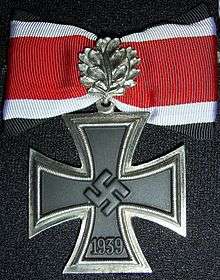Heinrich Eberbach
| Heinrich Eberbach | |
|---|---|
 Eberbach as an Oberst in the Panzerwaffe. | |
| Born |
24 November 1895 Stuttgart, Kingdom of Württemberg, German Empire |
| Died |
13 July 1992 (aged 96) Notzingen, Baden-Württemberg, Germany |
| Allegiance |
|
| Service/branch |
Deutsches Heer Heer |
| Years of service | 1914–20, 1935–45 |
| Rank | General der Panzertruppe |
| Commands held |
Panzer-Regiment 35 5. Panzer-Brigade |
| Battles/wars | |
| Awards | Knight's Cross of the Iron Cross with Oak Leaves |
| Other work | Polizei (1920–35) |
Heinrich Kurt Alfons Willy Eberbach (24 November 1895 – 13 July 1992) was a German General der Panzertruppe in the German Army of World War II. He was a recipient of the Knight's Cross of the Iron Cross with Oak Leaves, awarded by Nazi Germany to recognise extreme battlefield bravery or successful military leadership.
World War I and interwar years
Heinrich Eberbach was born on 24 November 1895 in Stuttgart, the German Empire. Eberbach graduated with his Abitur (university-preparatory high school diploma) on 30 June 1914. On 1 July 1914, Eberbach joined the military service of the Imperial German Army.[1] With the outbreak of World War I, Eberbach's unit was deployed on the Western Front.[2] On 16 October 1914, Eberbach was wounded in his thigh by artillery shrapnel.[3] In September 1915, Eberbach was severely wounded, losing his nose, and was taken prisoner of war by French forces.[3] During the 1920s Eberbach was a police officer; in 1935 joined the Wehrmacht. In 1938 be became commander of a Panzer regiment, in the newly formed 4th Panzer Division under Generalmajor Georg-Hans Reinhardt.
World War II
Eberbach participated in the German Invasion of Poland in September 1939 and then in 1940 in the Battle of France. His unit supported General Manteuffel's offensive across the Meuse River in May. Shortly after the start of the June 1941 invasion of the Soviet Union, he was assigned as commander of the German 5th Panzer Brigade in Heinz Guderian's XXIV Panzer Corps. In March 1942 he was made commander of the 4th Panzer Division, in the German lines opposite the Russian town of Sukhinichi, roughly 120 miles west of Tula.
In late November 1942 Eberbach was appointed commander of the XLVIII Panzer Corps that had just been overrun in the initial days of Operation Uranus. Eberbach was soon wounded and evacuated, remaining hospitalized until February. He then became Inspector of the Armored Troops in the Home Army, was awarded the Knight's Cross of the Iron Cross and promoted to Lieutenant General.
In November 1943 Eberbach became commander of troops around Nikopol and fought in battles around Zhitomir in the Soviet Union. In early 1944 Eberbach was promoted to the rank of General der Panzertruppe. During the Normandy invasion, he fought against the British landings along the 'Juno' and 'Sword' beaches. On 2 July he took command of "Panzer Group West" (5th Panzer Army) when Leo Geyr von Schweppenburg was wounded. On 9 August, this force was divided, with 5th Panzer Army retreating with the most damaged units; the effective units were reorganized as Panzergruppe Eberbach.
Eberbach was directed to lead this force in the counterattack through Mortain toward Avranches that was intended to cut off the Allied forces which had broken out of Normandy. According to Eberbach's post-war memoirs, he had no confidence in the attack. When General Warlimont of OKW arrived at his HQ on 1 August to "get a closer look at the situation", Eberbach told him that "the only possible solution was an immediate retreat to the Seine-Yonne line."[4] However, Warlimont denied Eberbach's request to withdraw, and instead confirmed the order to attack.
The attack failed, and most of Panzergruppe Eberbach and 7th Army was surrounded and destroyed in the Falaise Pocket. Eberbach escaped and was given command of the remnants of 7th Army on 21 August. On 31 August while out on a reconnaissance patrol, Eberbach was captured by British troops at Amiens.
Post World War II

Eberbach was held in a prisoner-of-war camp until 1948. Gersdorff participated in the work of the U.S. Army Historical Division, whereas, under the guidance of Franz Halder, German generals wrote World War II operational studies for the U.S. Army, first as POWs and then as employees.[5] Eberbach was the father of Oberleutnant zur See Heinz-Eugen Eberbach, commander of U-967 and U-230 during World War II.[6]
Works
- Eberbach, Heinrich (1945–1954). Panzer Group Eberbach and the Falaise Encirclement. Karlsruhe, Germany: Historical Division, Headquarters United States Army, Europe, Foreign Military Studies Branch. OCLC 33089881.
Awards
- Iron Cross (1914) 2nd Class (12 October 1914) & 1st Class (10 November 1917)[7]
- Wound Badge (1914) in Black (1915)[7]
- Friedrich Order 3 B with Swords (8 June 1917)[7]
- Wehrmacht Long Service Award 2nd Class (2 October 1936)[7]
- The Honour Cross of the World War 1914/1918 (1937)[7]
- Panzer Badge in Silver (20 June 1940)[7]
- Eastern Front Medal (14 August 1942)[7]
- Honour Roll Clasp of the Army (8 December 1941)[7]
- Knight's Cross of the Iron Cross with Oak Leaves
- Knight's Cross on 4 July 1940 as Oberstleutnant and commander of Panzer-Regiment 35[8]
- 42nd Oak Leaves on 31 December 1941 as Oberst and commander of the 5. Panzer-Brigade[8]
References
Citations
- ↑ Stockert 1996, p. 232.
- ↑ Wegmann 2004, p. 339.
- 1 2 Wegmann 2004, p. 337.
- ↑ Eberbach 1945–1954, pp. 9–10.
- ↑ Kienle 2005.
- ↑ Mitcham 2009, p. 181.
- 1 2 3 4 5 6 7 8 Wegmann 2004, p. 340.
- 1 2 Scherzer 2007, p. 285.
Bibliography
- Kienle, Polly (2005). "Still Fighting for the Myth: German Wehrmacht Officers' Reports for the U.S. Historical Division". H-net.com. Archived from the original on 28 January 2016.
- Mitcham, Samuel W. (2009). Panzers in Normandy: General Hans Eberbach and the German Defense of France, 1944. Mechanicsburg, Pa.: Stackpole Books. ISBN 978-0-8117-4447-8.
- Scherzer, Veit (2007). Die Ritterkreuzträger 1939–1945 Die Inhaber des Ritterkreuzes des Eisernen Kreuzes 1939 von Heer, Luftwaffe, Kriegsmarine, Waffen-SS, Volkssturm sowie mit Deutschland verbündeter Streitkräfte nach den Unterlagen des Bundesarchives [The Knight's Cross Bearers 1939–1945 The Holders of the Knight's Cross of the Iron Cross 1939 by Army, Air Force, Navy, Waffen-SS, Volkssturm and Allied Forces with Germany According to the Documents of the Federal Archives] (in German). Jena, Germany: Scherzers Miltaer-Verlag. ISBN 978-3-938845-17-2.
- Searle, Alaric (2003). Wehrmacht Generals, West German Society, and the Debate on Rearmament, 1949–1959. Westport, CT: Praeger Publishers. ISBN 978-0-275-97968-3.
- Stockert, Peter (1996). Die Eichenlaubträger 1939–1945 Band 1 [The Oak Leaves Bearers 1939–1945 Volume 1] (in German). Bad Friedrichshall, Germany: Friedrichshaller Rundblick. ISBN 978-3-9802222-7-3.
- Wegmann, Günter (2004). Die Ritterkreuzträger der Deutschen Wehrmacht 1939–1945 Teil VIIIa: Panzertruppe Band 1: A–E [The Knight's Cross Bearers of the German Wehrmacht 1939–1945 Part VIIIa: Panzer Force Volume 1: A–E] (in German). Bissendorf, Germany: Biblio-Verlag. ISBN 978-3-7648-2322-1.
External links
- "Rommel: Ende einer Legende" [Rommel: The End of a Legend]. Der Spiegel (in German). 38. 1978. ISSN 0038-7452. Retrieved 30 May 2016.
- "Die Kraft des Bösen" [The Power of Evil]. Der Spiegel (in German). 44. 2012. ISSN 0038-7452. Retrieved 30 May 2016.
| Military offices | ||
|---|---|---|
| Preceded by General der Panzertruppe Willibald Freiherr von Langermann und Erlencamp |
Commander of 4. Panzer-Division 6 January 1942 – 2 March 1942 |
Succeeded by Generalleutnant Otto Heidkämper |
| Preceded by Generalleutnant Otto Heidkämper |
Commander of 4. Panzer-Division 4 April 1942 – 14 November 1942 |
Succeeded by Generalleutnant Erich Schneider |
| Preceded by General der Panzertruppe Hans Cramer |
Commander of XLVIII Panzer Corps 26 November 1942 – 30 November 1942 |
Succeeded by General der Panzertruppe Otto von Knobelsdorff |
| Preceded by General der Infanterie Dietrich von Choltitz |
Commander of XLVIII Panzer Corps 22 October 1943 – 14 November 1943 |
Succeeded by General der Panzertruppe Hermann Balck |
| Preceded by Waffen SS General Paul Hausser |
Commander of 7. Armee 21 August 1944 – 30 August 1944 |
Succeeded by General Erich Brandenberger |
